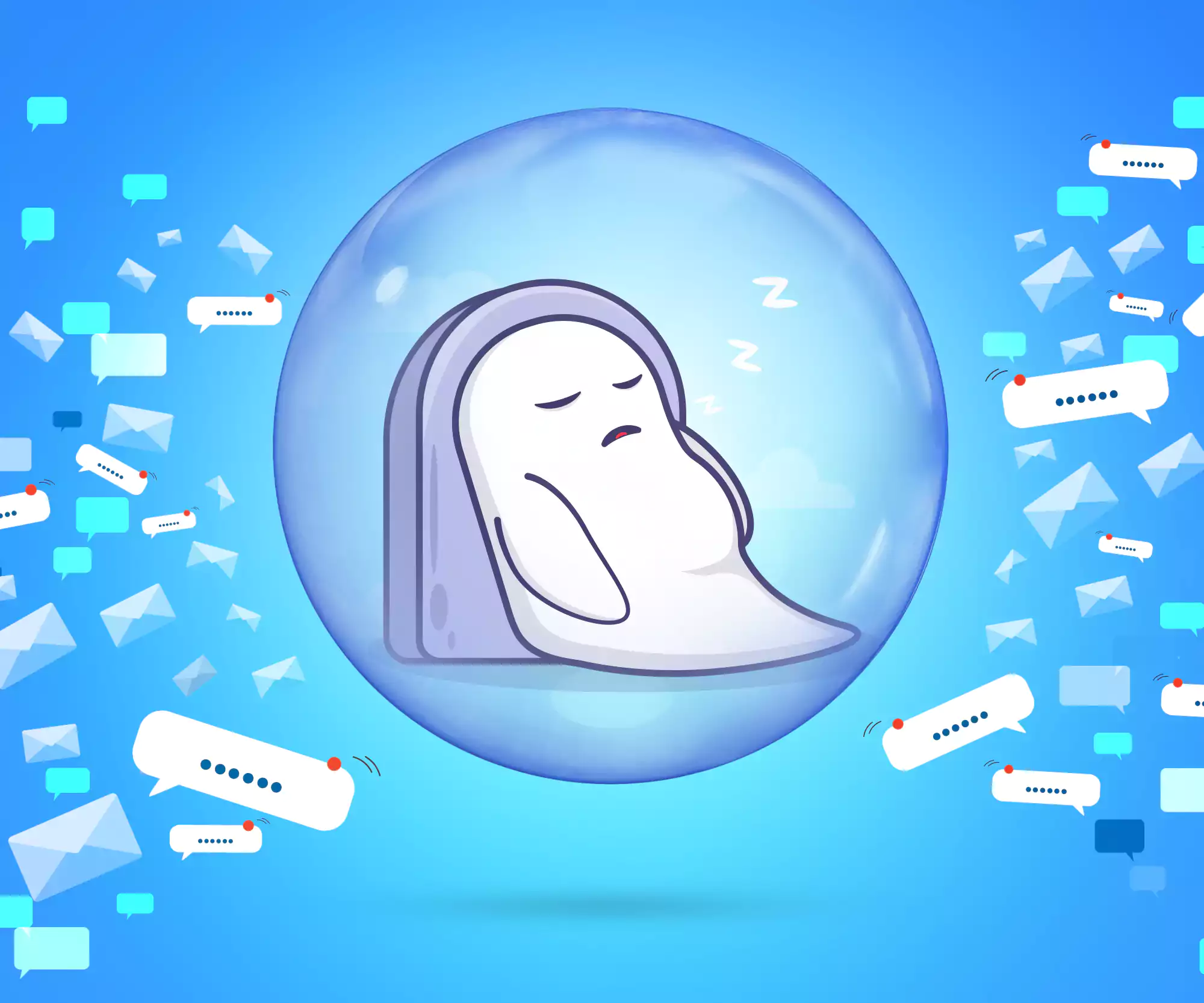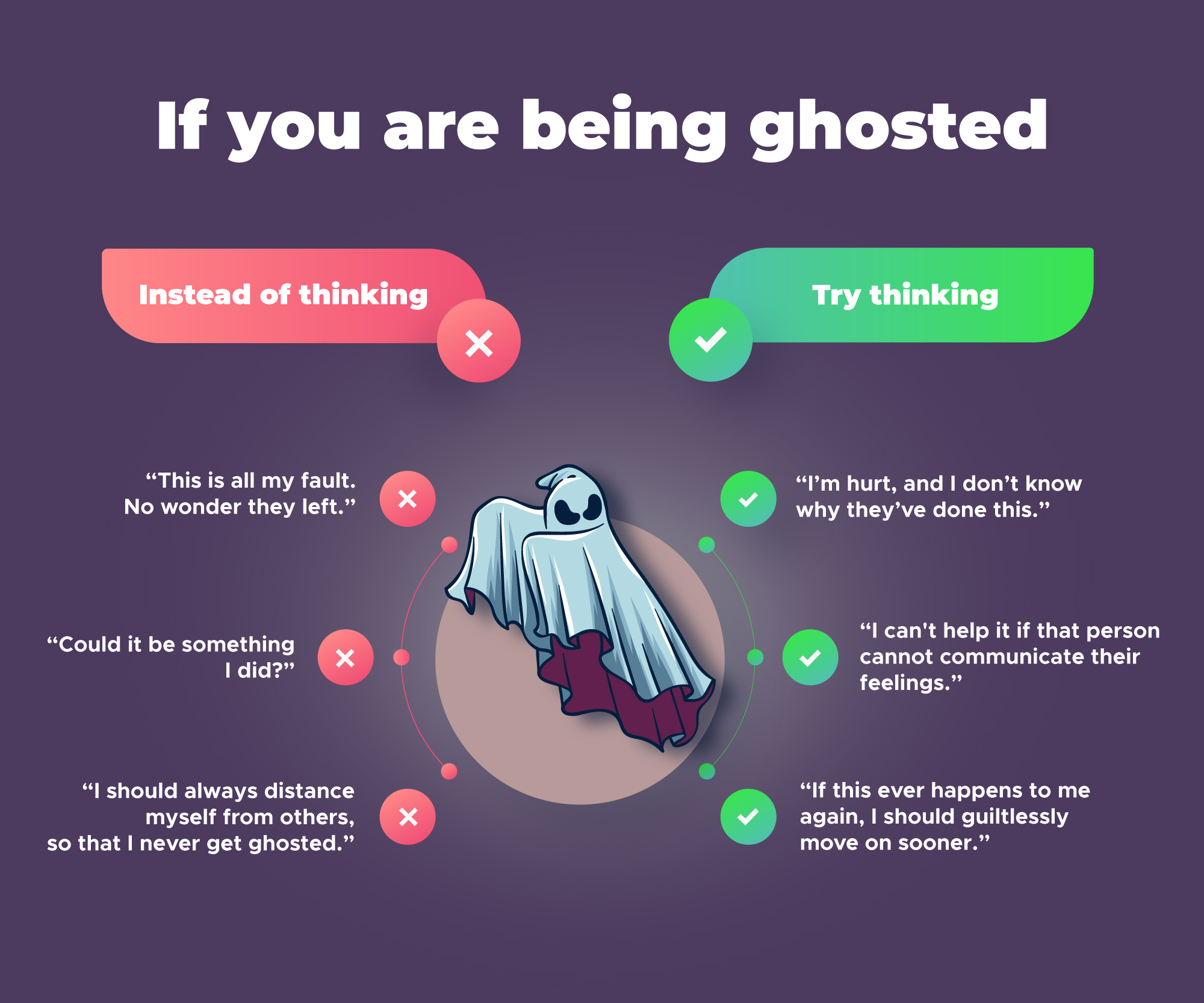
We may have wound past Halloween, but a certain spooky phenomenon still haunts us all year round. Of course, I’m talking about ghosting. While the term may bring to mind a phantom presence peeping over your shoulder, the term actually refers to the opposite: a sudden lack of a presence!
Ghosting is hardly a 21st-century phenomenon. On the contrary, people have broken off communication without warning for as long as humans have communicated with each other! But what makes ghosting more conspicuous in our era is the nature of instant communication. For instance, devices and social networks inform us that a message is read (thanks to the devastating accuracy of ‘read reports’), and we wait forever for a response!
Behind the scenes of ghosting
Ghosting may have its reasons, but it affects all parties involved differently. It is a practice with every possible shade of grey. Think of your own life: have you ever wanted to cut off communication with someone for any reason? Have you taken longer and longer to respond to calls or messages, hoping the other person would eventually tire of trying to stay in touch? Did you ever feel justified doing this? Was there any residual guilt?
Psychological research has only recently focused on the phenomenon of ghosting. The term itself dates back to 2004. One of the many studies was conducted among 76 college students. The study looked at why people would ghost and what the effects might be. Results showed that the person who did the ghosting (the ghoster) suffered few adverse effects. But on the other hand, the person who was the victim of ghosting suffered from lower self-esteem in the short term and could go on to develop long-term mistrust in relationships.
Popular movie depictions and memes may lead us to consider ghosting as restricted only to romantic relationships. It is not. Even platonic relationships suffer when one friend decides to ghost the other. There are also increasing reports of employers who ghost prospective employees midway through hiring and employees who disappear without further contact with their employer.
Why is ghosting such a widely-used tactic?
Studies and interviews of people who have ghosted others point to similar causes:
- Anxiety: Social anxiety can make it hard to converse with someone if they make you feel uncomfortable or pressured.
- Conflict avoidance: Even without pre-existing anxiety, many people dislike conflict and the drama or aftermath it brings.
- Feeling unsafe: Ghosters might believe the person has already violated their boundaries and that a conversation will put them at risk.
- Preventing attachment: Some ghosters say they are worried they may develop feelings for the other person and therefore consider ghosting a mode of self-preservation.
- Protecting someone’s feelings: On the flip side, some people think that ghosting the other person means sparing them from direct rejection and the hurt it could cause.
Ending all communication seems like a pretty good solution to all these concerns. The ghoster may even feel relief. However, sometimes it may cause further anxiety (especially if the other person persistently attempts to get in touch). And sometimes, it leaves residual guilt.
While ghosting is often an easier solution, it isn’t always consequence-free for either party.
The effects of being ghosted
By the very nature of ghosting, the victim has no clue what caused the termination of communication. They have had no warning or explanation and are left to devise the best reason(s) for themselves. A person may sometimes reassure themselves that it’s all the other person’s problem and that they are much better off without someone who can just ‘flake’. But this is not always the reaction that predominates.
Many people, especially those already prone to anxiety or low self-esteem, begin to wonder what they have done wrong. They assume they have angered the other person or were not interesting enough to keep the person engaged. As a result, they may examine every perceived flaw within themselves to draw negative conclusions about their intrinsic worth. Eventually, this can lead to the fear that they will never interest other people. In different situations, being the victim of ghosting could lead to social isolation or even a desire to cut people out of their lives to protect themselves. These are not uncommon reactions, especially when people undergo significant change, like joining a university.
Effects on the ghoster
The studies so far show that many ghosters feel a sense of relief. However, many also wish they could have overcome their anxiety to have a conversation and clear the air. There is also the fear that, given its benefits in the internet age (instant disengagement, anonymity), a person could become a habitual ghoster. A habitual ghoster would use the same tactic in any relationship when things get complicated. This could be harmful in the long run, not only for others but also for themselves. Ghosting people regularly would prevent them from developing their communication skills, and they may scrap potentially reparable and healthy relationships with the rest.
Ghosting is also often correlated with negative personality traits or even personality disorders. Although a few studies indicate some correlation, there is nothing conclusive. Therefore, it’s best to wait for significant evidence before assuming that the ex who ghosted you is the new Zodiac Killer!
What do I do if I’m the victim of ghosting?
It is important to recall that the onus for explanation lies on the ghoster. Even if the ghoster has a valid reason for not wanting to communicate, this may only be clear if they tell you. Additionally, you have a chance to see whether or not you wish to address this behaviour.
Being the victim of ghosting once or twice may make you believe everyone will ghost you. As a result, you may even communicate less with others to ensure they respond or reach out of their own accord. While this may be reassuring, it is essential to be careful here. It is also vital to avoid rashly misjudging a delayed response as ghosting.
If you spend a lot of time tracking this person’s activities online (using their ‘last seen’ time on various apps, trying to monitor their other online communication, etc.), you may want to take a step back and block them. However, it would help if you also considered speaking to a professional. A trained therapist would help you deal with the inevitable feelings of hurt and anger that prevent you from detaching from the relationship.
Experiencing ghosting is undoubtedly unpleasant, and your feelings of rejection, hurt, and confusion are very valid. But consciously looking at how you process these emotions and being mindful of your interpretations can help.

And if I’m a ‘ghost’?
While I have ghosted people myself, for some of the reasons mentioned here, I try to be more mindful of my behaviour these days. With instant communication and social media, many of us have way more social engagement than we can handle. So it is only natural that we try to trim down this list to people we genuinely want to be in touch with.
So what happens to the rest? Sometimes, ghosting is a simple solution. However, I recommend weighing the pros and cons. If someone makes you uncomfortable and you feel unsafe about telling them so, ghosting may be convenient and useful.
As a general rule, you should consider how you would like to be treated if the roles were reversed. For example, is there a generic, non-committal response which can indicate that you will be unavailable in the future? Is there even a direct (gentle but firm) way to tell you don’t want to take a conversation forward?
In a professional context, this is very important. However, in a personal context, it may help to be more compassionate when detaching, both for the other person and your feelings towards yourself!




